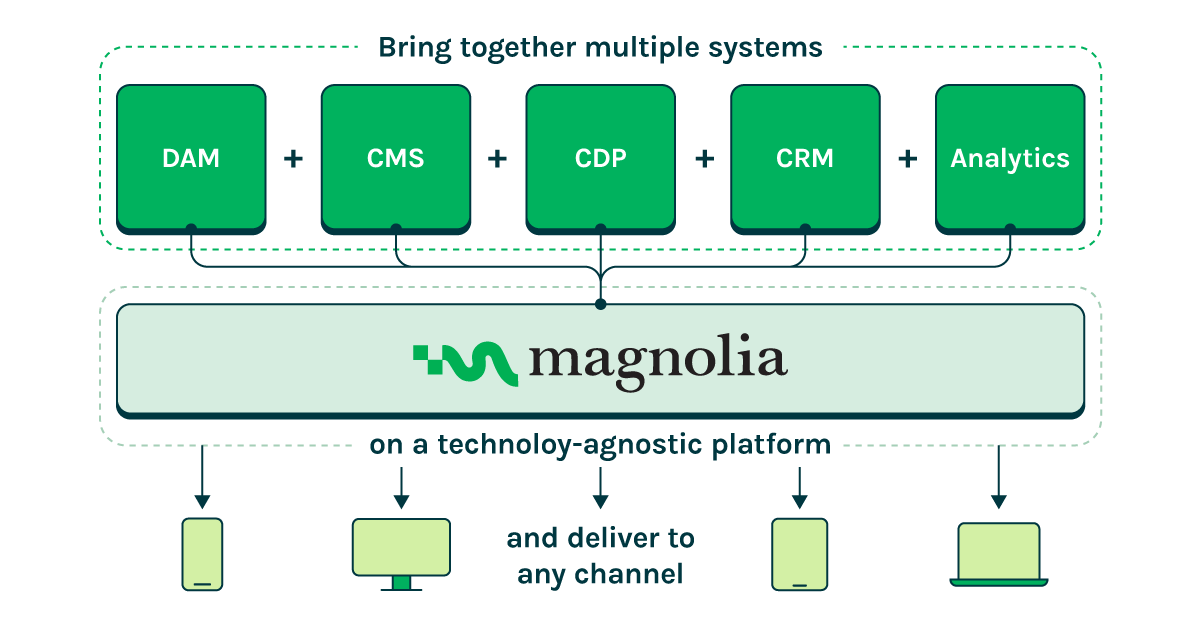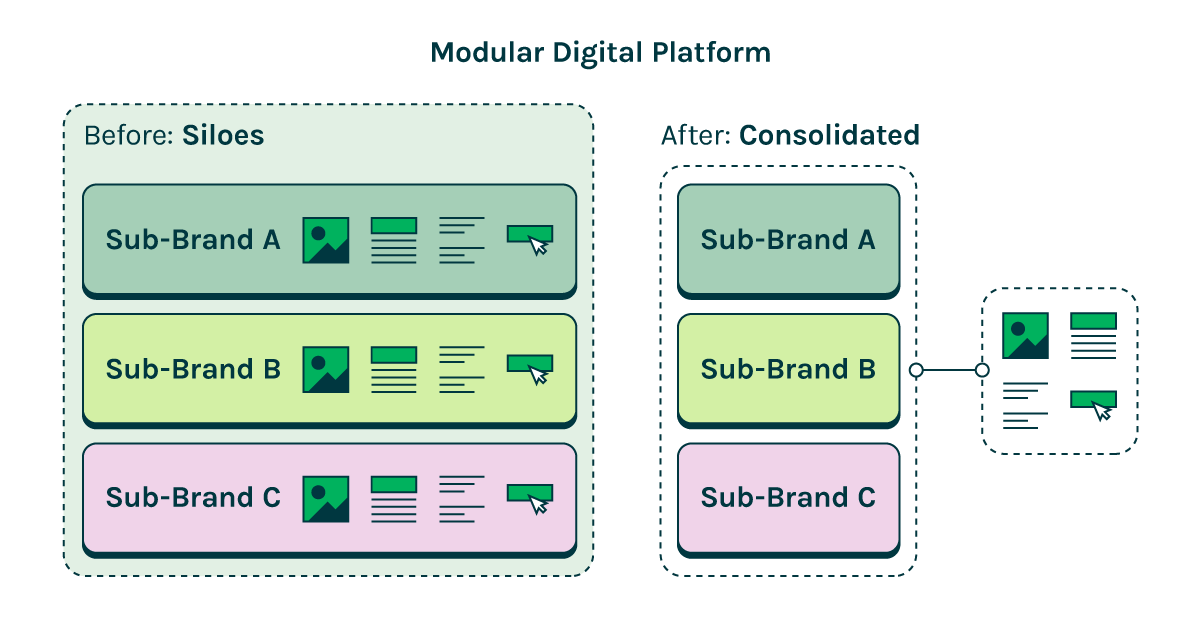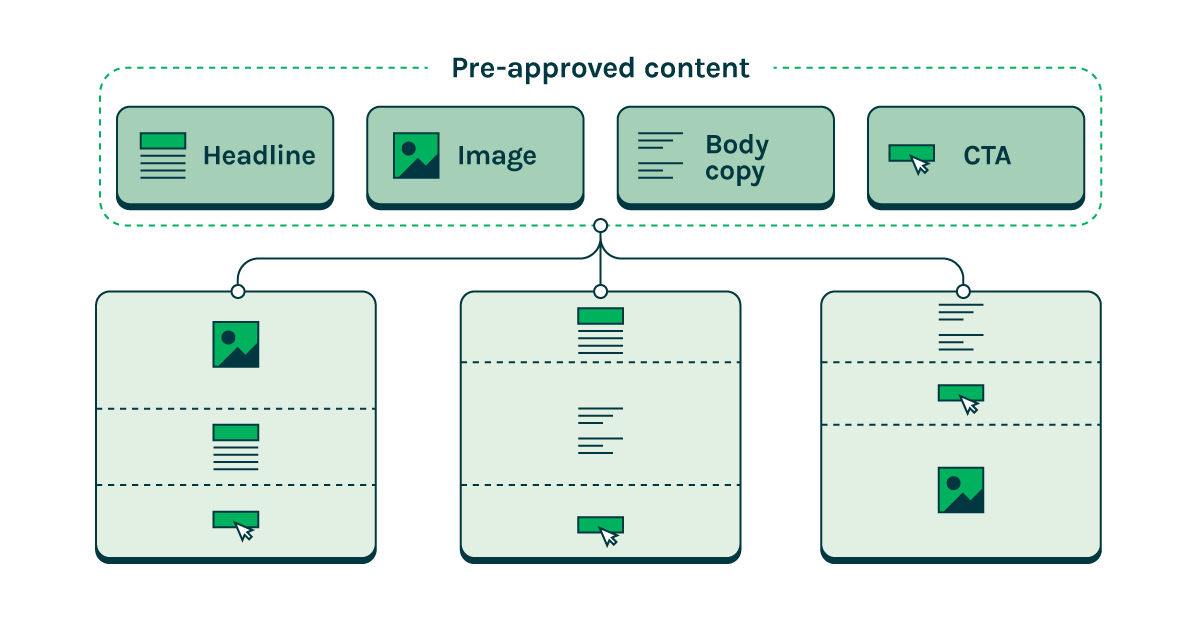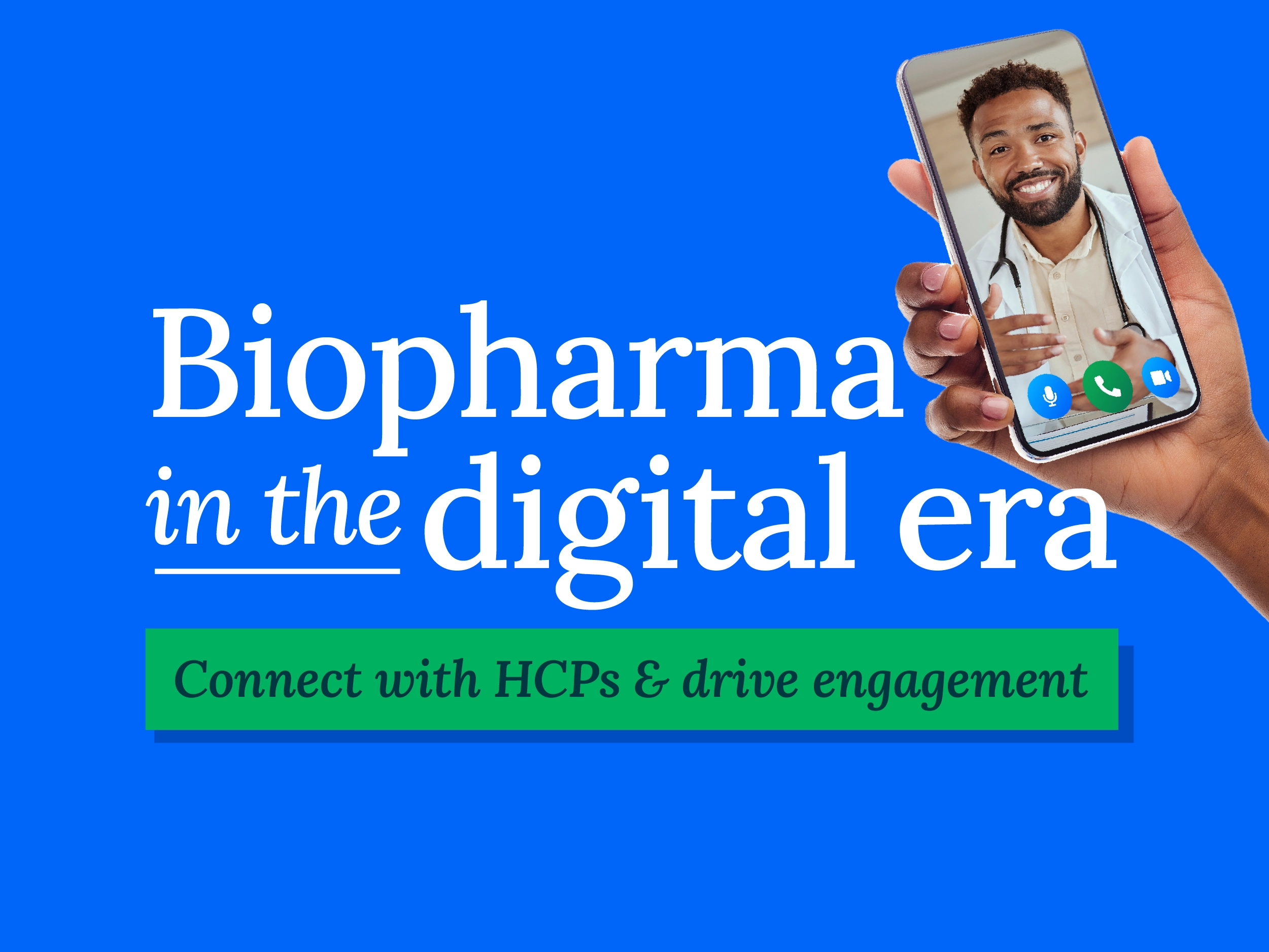- Jan 18, 2024
- 9 min
Powering modular approaches with a DXP in the biopharma industry
Magnolia in action
Take 12 minutes and a coffee break to discover how Magnolia can elevate your digital experience.
In the three years since the start of the pandemic, the biopharma industry has experienced a decade of digital transformation. Organizations were forced to quickly shift to a digital-first approach, and now there is no turning back.
Today nearly a third of HCPs are starting their conversations with field teams through an inbound channel like chat, and most now prefer to maintain or increase their virtual interactions. HCPs increasingly want self-service on digital channels versus always having to engage with a sales rep, making digital options like branded biopharma portals critical to getting HCPs the right information and collateral.
Digital engagement is now a necessity. In-person access to HCPs and hospitals won’t return to pre-COVID levels. Interestingly however, overall HCP access is better post-pandemic because of more digital touchpoints and the ability to use video and other virtual channels to complement in-person meetings.
The decline in the blockbuster drug model and rise in precision medicine are also advancing the use of digital channels. Companies are transforming their go-to-market strategies and processes to commercialize commodity products more broadly to audiences in very competitive markets, as well as drive personalized engagement with HCPs that are treating smaller patient groups with rare and individualized diseases. Digital allows sales reps to reach and educate more doctors than in-person channels ever could.
Moving ahead, digital-first strategies will be key in better meeting physicians on their terms, getting them information to treat patients, and brands quickly addressing medical inquiries. The biopharma companies that master digital engagement and delivering valued, high-quality customer experiences will improve HCP relationships and drive better patient outcomes.
Companies across the life sciences industry are putting their digital infrastructures in place. Now the question becomes how best to do it and advance the HCP experience. Organizations are making the shift to modular approaches and easy-to-use, scalable, and secure Digital Experience Platforms (DXP) to integrate their commercial digital ecosystems; give brand and marketing teams a way to easily create and globally distribute compliant content faster; and provide advanced privacy and security.
What is a DXP and composability?
A DXP is a platform of integrated technologies that allows developers and, perhaps more importantly, non-technical users like sales and marketing teams to collaborate, create, manage, and deliver content and digital experiences across many channels and customer touchpoints in a consistent, unified way.
The DXP approach is especially significant today for biopharma to enhance the digital journey for HCPs and patients and improve their experiences with a company’s various brands. There is a major industry disruption underway as companies move toward new models of digital experience management.
The digital approach for many biopharma companies consists of thousands of websites and portals, along with complex content and digital asset management. Complicating things is the fact that various brand teams typically want to use their own set of systems and to control the look, color, design of their pages and content.
For a CMO, this creates inconsistency across brands and disjointed online experiences for customers. For a chief digital officer, siloed and disparate systems are already too expensive to manage and maintain to justify greater investment into more digital systems. For MLR teams, inconsistent review and approval workflows with various brand teams increase compliance risk.

Altogether, the process of creating and delivering content and digital experiences is rampant with technical and publishing delays that create inefficiencies for everyone involved, including brand and marketing teams.
Sound painfully familiar?
A big step to alleviating this challenge is adopting a composable, or modular, DXP. A composable DXP is built using a modular architecture, allowing digital transformation leaders and brand teams to seamlessly swap technologies and tools without disrupting commercial operations. Easily pick, choose, and change a CRM, CMS, DAM, CDP, and analytics system and adapt digital strategies and execution to meet changing HCP and patient behaviors and needs.
Integrations are key to a DXP platform, creating unified customer experiences, and speeding up digital delivery.
White paper: Engaging with HCPs in the digital era for biotech and pharma
Learn how today's biotech and pharmaceutical companies can connect with healthcare professionals effectively and quickly while maintaining compliance.
Seamless integrations connect any data source, application, and channel
Nearly two decades ago, it was clear that digital was going to be a major disruption. It was the early days of Web 2.0 and new technologies like a CMS were becoming mission critical. We knew things weren’t going to stop there.
As digital matured and the ability to deliver more experiences across channels became more important, companies would adopt more technologies. It would no longer be a matter of integrating two or three systems. In the future, organizations would have 20 or more technologies. Integrations and the implementation of composability would be essential.
Fast forward to today, biopharma companies are accumulating more systems and technologies as digital takes hold. This has created a sprawling digital ecosystem for organizations, especially as brands adopt siloed and disparate commercial systems and applications.
As more systems are added, it becomes harder and more costly to synchronize, manage, and scale a digital infrastructure across multiple countries and adapt as business needs change. Consider a pharma organization that has many brands and hundreds of websites and portals, and it is not hard to imagine how quickly things can become unmanageable and unscalable.
A modular DXP allows companies to bring together their multiple systems on a single, technology-agnostic platform. Seamless integrations make a digital infrastructure cheaper to manage and maintain, as well as simpler to create, adapt, and scale digital experiences across every territory, brand, site and channel.
Magnolia recently helped a top 10 pharma company consolidate all their brands and hundreds of sites on the Magnolia DXP platform. With all their websites and pages on a single platform, they can significantly reduce the time and cost of managing and maintaining all their digital properties by using a single powerful interface.

For a leader driving digital transformation in their organization, easy, pre-built integrations enable them to eliminate the cost and risk of switching technologies. And for marketing and content teams, a modular DXP makes it easier to create and publish content and drive multichannel engagement.
User-friendly DXP to develop HCP portals, power modular content, and drive omnichannel engagement
The rapid shift to digital is creating a greater need for promotional materials and digital content to power omnichannel engagement with HCPs. But for many brand and marketing teams, it is difficult to develop and publish content, keep pace with growing demand, and ensure information stays current, accurate, and compliant in HCP portals and other digital channels.
MLR review and approval often slows digital content delivery because of inconsistent review processes that vary across internal brand teams and external marketing agencies. Not only does this make it harder to share and reuse content, but also to control content and claims, increasing compliance risks and potential for costly fines.
The Magnolia DXP simplifies complicated content operations by bringing together multiple marketing systems. Marketing leaders can consolidate all marketing content from multiple sources in one central content hub, including third-party CMS solutions they may already be using, to enable content reuse across channels.
This also allows brand teams to use their preferred systems and have one common interface to create digital experiences. The Magnolia DXP powers unified authoring so marketers can create experiences from a central user interface and in one seamless workflow, regardless of the content source. Users have the right information exactly where they need it across multiple brands and sites to drive consistent information to HCPs in every channel.

With the Magnolia DXP, commercial organizations have the freedom to manage their own workflows, create and publish customized portals, quickly assemble new site pages, produce content at their own pace and scale, quickly launch new campaigns when needed, and deliver more personalized experiences – without coding, IT, or a developer’s help.
Marketing teams, both internal staff and outside agencies, can also power their modular content approaches. Instead of building assets from scratch each time, teams can access pre-approved content modules such as text, images, and claims from a central DAM and recombine them into a variety of new polished, MLR-approved assets.
This allows commercial teams to create and assemble pages quickly and easily, publish content, and continually enrich HCP portals with information that physicians need to care for their patients. The same MLR-approved assets can also be reused across many other channels and global regions.
A modular content approach helps MLR teams as well, establishing a consistent process for reviews and approvals. Instead of going through multiple rounds of MLR review, MLR teams can have confidence that once content modules are approved, they remain unchanged and accurate. And with Magnolia DXP integration with Veeva Vault PromoMats, any time updates need to be made to content modules, they are synced automatically to keep content updated and compliant.
In addition to integrations and user-friendliness, having the right security requirements are essential to choosing the right digital experience platform.
Advanced privacy and security protect content and HCP portal access
A critical aspect to a DXP is data security and privacy. HCP portals contain highly sensitive and confidential information such as clinical trial data that needs to be protected. Unauthorized access can have severe consequences for biopharma companies, from regulatory scrutiny to trust erosion with a brand.
Given the sensitivity of certain information provided to HCPs, portals must reliably validate the identify of physicians and ensure compliance with various privacy regulations. Implementing single sign-on (SSO) and identity verification can be a challenge, especially across various brands and sites for a biopharma company.
The Magnolia DXP prioritizes security and compliance, providing industry-leading access control, profile management, and secure authentication methods to prevent unauthorized access. Over its history, Magnolia has a track record of success in other heavily regulated industries such as finance, defense, and insurance, delivering security that is enterprise-ready and certified by an external security company.
With the Magnolia DXP, biopharma companies can ensure only validated HCPs are accessing sensitive information in a portal. The modular architecture of the Magnolia DXP allows organizations to integrate with a wide range of marketing-leading SSO providers to simplify user-management, roles, and permissions to protect content. Stringent data encryption also provides an added layer of protection to reduce the risk of unauthorized access or data breaches.
The Magnolia DXP adheres to high-standard certifications and compliance with security and privacy standards, including SOC2, ISO 27001, and GDPR. And soon, Magnolia will offer web-defacement protection and active threat monitoring to further guard against any threats of incorrect data reaching the market.
The digital foundation for commercial execution
With more HCPs preferring online interactions, digital engagement is here to stay. Biopharma companies are racing to put the right infrastructure in place to power their digital-first strategies and improve the HCP experience through new channels and innovative portals.
Modular approaches will be key to advancing digital in life sciences. Integrations, user-friendliness, and security will be hallmarks of next-generation digital experience platforms. The Magnolia DXP gives biopharma the flexibility they require to deliver the customer experiences HCPs want. With its modular architecture and ability to power modular content, Magnolia is poised to help biopharma customers make omnichannel engagement core to how they do business.
Interested in taking a deeper look? To learn more about how Magnolia brings HCPs and patients closer together with a digital-first strategy, download our white paper.











